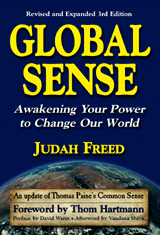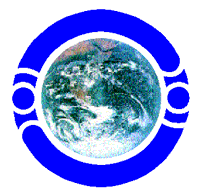.
Part I.
ON THE
NATURE OF GOVERNMENT IN GENERAL
"Society is produced by our
wants, and government by our wickedness...
Society in every state is a blessing, but government even
in its best state is but a necessary evil... For were the
impulses of conscience clear, uniform, and irresistibly
obeyed, man would need no other lawgiver."
--
Thomas Paine, Common Sense ......
ANY human endeavor needing more
than one person to get the job done right requires a
shared vision of cooperation to complete the task. The
organizational metaphors we work by have changed over the
centuries. Supplanting images of the feudal manor, in the
Industrial Revolution we began viewing organizations as
"clockwork machines." The Computer Revolution then
started us looking at organizations as integrated
"systems." We shifted from talking about "organizational
structures" to discussing "organizational functions."
But dead devices can never
supply a viable vocabulary for describing human
interactions in groups. We all live, love, learn, work,
play, and vote in evolving cultures generated by
our individual and collective "communication behaviors,"
What we say and do forms our homes, schools, jobs,
communities, and nations. Our use of language and acts of
communication spin the web of all our relations.
Relationships create our world.
Communication
is the central process of life.
Our Legacy of
Tyranny
DISTINCTIVE and competing people
and groups may interact peacefully when they agree upon a
system of communication for mutual governance. Without a
shared social contract, society soon descends into
chaos. Out of crazy disorder appears a charismatic leader
followed by true believers who impose their new world
order upon society, for a season, until offbeat and
outcast rebels sufficiently disrupt the status quo (while
hermits hide away in dismay). Entropy quickly gathers
speed, unraveling the social fabric, then disorder
returns, a brave new leader conquers the throne, another
dynasty falls, and so the cycle replays in every
generation.
Swinging between the extremes of
anarchy and tyranny, we dangle above the abyss of
extinction like wild apes awaiting an alpha male racing
to our rescue (even if our savior is female). We beseech
gods for heroes and anointed kings, then slay the saints
who tame the dragons. We make war, not peace in our
time.
Lacking a sense of our
interdependence, we disdain self determination. Trying to
gratify our need for inner security with "external
validations" (sex, fame, money, power, chocolate), we run
amok. We refuse to balance liberty with responsibility.
We'd rather not grow up. We'd rather make others wrong so
we feel right. We'd rather let our lives fall into ruin
than do anything useful to help ourselves survive and
thrive. We're like a starving man waiting to be handed
food within easy reach. The pop-psych folks call it
codependency. We hunger to be saved from the hard reality
of saving ourselves. Our cravings have fed every tyrant
since time began.
Buttressing a penchant for
pledging oaths to monarchs and messiahs, another trait
hindering us from "doing democracy" is our faith in
hereditary succession. Once any authority becomes
entrenched, we accept them as our new godhead without a
word. Blind allegiance to any form of royalty degrades
and lessens ourselves, so, permitting the claiming of
power as an inherited right is an imposition and insult
upon posterity. Just because someone has power doesn't
mean they can keep it.
We are each of us created equal
with inalienable natural rights. No person or group,
whether in a position of authority by accident of birth
or by ascent from merit, has any right to put their own
family or friends in perpetual
power to the effective
exclusion of all others. The benevolent despot of the day
may deserve honor, yet descendants typically become
insane from inbreeding. Why continue serving the reckless
rulers who fiddle around as our homelands burn? Why must
we fight and die for survival of the fittest in a world
not fit for living? Why be fearful of fear
itself?
Despite the inroads of democracy
since the American Revolution, most people still crave
royalty rule. Our organizations and government
institutions are still reliant on top-down methods of
management. Most of us are afraid to be our own boss. We
feel safer with a leader making the difficult decisions
for us. We obey because we want to obey. We
want to believe. Security matters more to us than
freedom. We are all born free, but everywhere we are
enslaved in chains of our own choosing.
Seeking Hope
For Democracy
LIBERTY unbound decays into
depravity, so prophesy the recorded histories. We hire
governments to protect and preserve us from our own lack
of self restraint. We want governments to control us
because we do not want to control ourselves. We cling to
"dysfunctional" systems of hierarchical management like
sodden alcoholics superglued to empty bottles. We are
tyranny junkies.
Because of our culturally and
even genetically perpetuated authority addiction,
we act out a compulsion from our "low self esteem" to
give away our freedom of choice to authority figures
"higher" than ourselves. Rather than rule our lives from
the inside, we yearn to be ruled from the
outside.
Must we always let life turn
desperate before Big Brother steps in with an iron fist
to save us from ourselves -- again? If the proper role of
any government is defending us from the bad guys using
force or fraud to meet their needs, whenever expedience
overrides compunction, objective people might well
wonder, what can make us refrain from utilitarian excess?
Libertarian dreams of global free trade in open markets
may rouse the passions, yet why evade accountability and
personal growth whenever public interests counter private
aspirations? Clichés about our "enlightened self
interest" are helpful, but where is our source of
illumination?
In an era when cynicism often is
warranted, can we see any rational basis for hope? In our
age of "globalization," most of us feel overwhelmed by
the rapid pace of change in society. We suffer from
"information overload," what Alvin Toffler calls "future
shock." Small wonder we want to be rescued by digital
messiahs.
In these hard times that test
our souls, most of us feel powerless to make any real
difference in the world. Many of us think that we cannot
have what we want in life. We believe we're too
worthless, clumsy, dumb, or sinful to trust our own right
use of free will. Aren't we told in childhood that we
should we expect the worst from ourselves, that we are
born evil? Why live a lie? Why escape from freedom when
the truth will set us free? Know yourself as living
light.
Given the habits of our hearts,
what will inspire us to make democracy work? What can
rekindle the fire of freedom in our bellies? What can
spark us into living with a love for life itself? What
can inspire us to live the way our souls want us to
live?
Interactive
Global Sense
BECAUSE acts of communication
construct our cultures as a cultures construct our acts
of communications, because the advent of the Internet
evidently is having a profound cultural impact already in
our daily lives, can we identify any signs of the new
media networks generating greater democracy?
New media technologies still
confound many of us (at least, until the interface
improves), but please pause to think about the nature of
this new social force.
The "digital distributed
networks" are widely decentralized, a woven lattice more
than a vertical hierarchy. The global media networks,
therefore, are innately more democratic than any previous
medium of communication, from tribal drums to TV. Given
the interplay between the media and our minds and our
world, the more we use the new interactive networks to
interact with others in our lives, the more we begin
seeing how much our lives are interactive within our one
fractal world.
Talk with anyone on the Internet
who daily interacts with people around the planet. Active
networkers often express an "interactive sensibility," a
deep awareness that we all can and must learn to get
along because we all are "interdependent." Their attitude
is rooted in a visceral and visual experience of being
linked to people and places through open communication
networks, copper wires or laser light fibers.
Visualize the popular photograph
of our blue earth alone in space, the snapshot taken on
the 1972 trip home from the moon. How can we gaze at that
sphere and continue pretending we're separate creatures
without any effect upon one another in our circle of
life? Like the thumb and fingers of one hand working in
concert, what if we know in our bones how interconnect
with others? How can we continue to plunder and murder in
our worldwide web of spirit?
What we do to others, we do to
ourselves. What goes around comes around. Growing mindful
of our unity amid diversity, a powerful global
sense of our interactivity guides us toward
responsible self rule, a personal
choice
to heed the subtle dictates
of
conscience
in our interactions, the
promise to be true to our souls. Evolving global sense
then motivates us to practice personal democracy,
the daily effort to consider other people's realities
when we interact with them, giving them a fair voice in
the decisions affecting them.
From who we marry and whether we
abuse our kids all the way through who takes out the
trash and whether we recycle, all of our personal choices
and actions have a real impact on the world. Knowing
we're interconnected, don't we feel more willing to
cooperate with one another in resolving our common
problems?
Knowledge is power. Ignorance is
bondage. We the people can enjoy freedom and prosperity
if we share responsibility for conserving the peace. What
if we implant into our cultural values a simple alertness
to our global interactivity? What if this engram of
global sense gets embedded into our cellular memories? In
time, like a teenager entering adulthood, we could mature
enough in our 21st Century Age of Communication to
manifest the vision of democracy that ignited the 18th
Century Age of Enlightenment. We already hold the power
to mold the media molding us. (Devout skeptics may find
therein ample cause for optimism about
democracy.)
-o-
HERE is the design and
purpose of government, to secure the blessings of liberty
for ourselves and our posterity. And here is the source
and nature of government, a mode of establishing social
order rendered essential by an absence of an interactive
sensibility to curb our ruthless impulses. Our abuse of
freedom makes government necessary. We may like to say
otherwise, but regardless of our creeds or doctrines or
social standing, regardless of whether personal interests
cloud our judgment, the "still, small voice" within us
says, this is true:
In our interactive world,
responsible self rule makes global sense.

 .PRIOR
SECTION
|
INDEX
| NEXT
SECTION .PRIOR
SECTION
|
INDEX
| NEXT
SECTION

|






